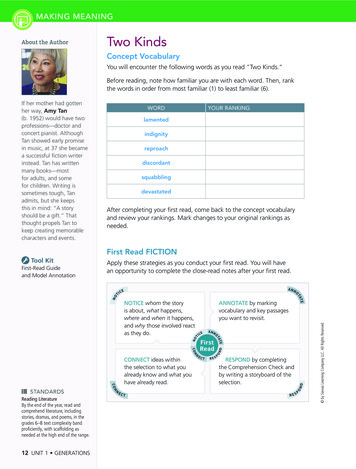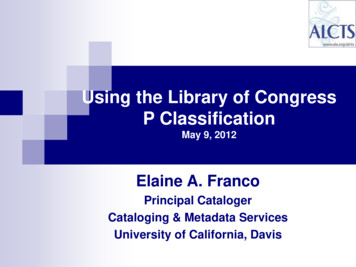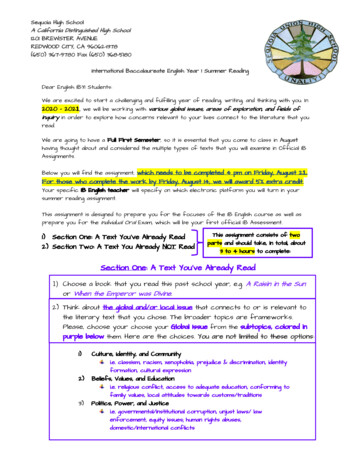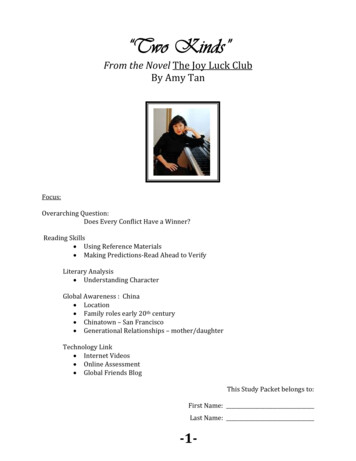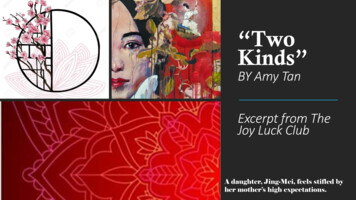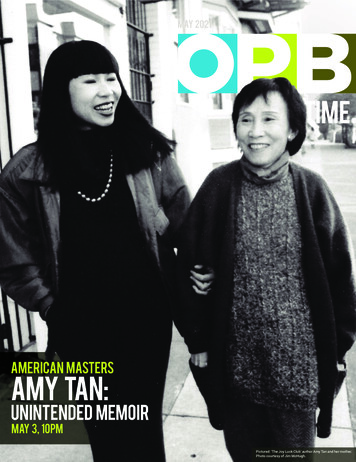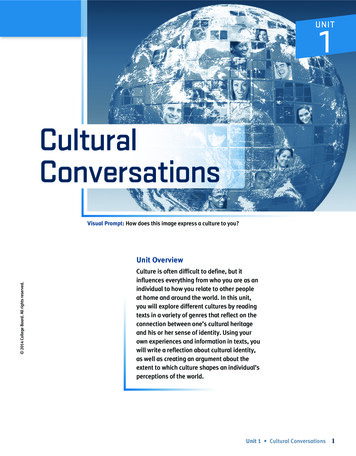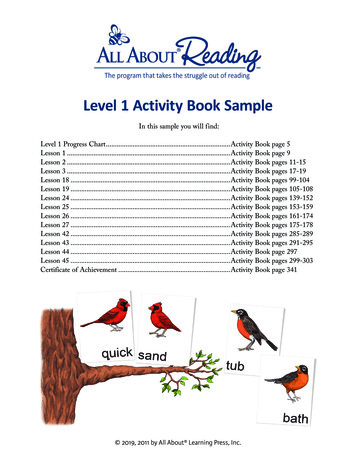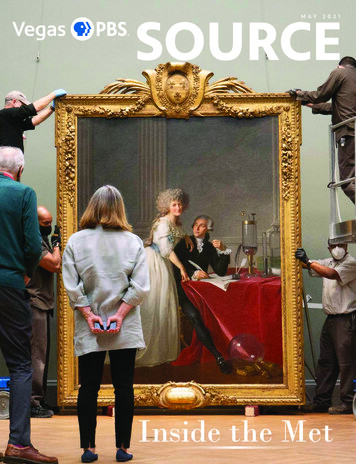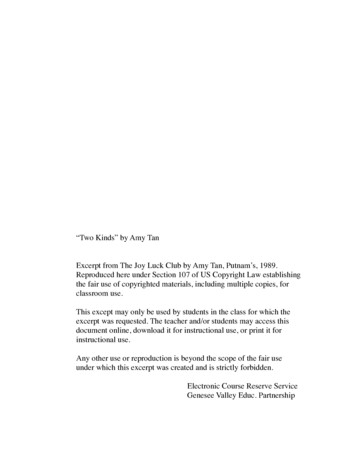
Transcription
“Two Kinds” by Amy TanExcerpt from The Joy Luck Club by Amy Tan, Putnam’s, 1989.Reproduced here under Section 107 of US Copyright Law establishingthe fair use of copyrighted materials, including multiple copies, forclassroom use.This except may only be used by students in the class for which theexcerpt was requested. The teacher and/or students may access thisdocument online, download it for instructional use, or print it forinstructional use.Any other use or reproduction is beyond the scope of the fair useunder which this excerpt was created and is strictly forbidden.Electronic Course Reserve ServiceGenesee Valley Educ. Partnership
JING-MEI WOOTw o K i n d sMy mother believed you could be anything you wanted to bein America. You could open a restaurant. You could work for thegovernment and get good retirement. You could buy a housewith almost no money down. You could become rich. You couldbecome instantly famous."Of course you can be prodigy, too," my mother told mewhen I was nine. "You can be best anything. What does AuntieLindo know.? Her daughter, she is only best tricky."America was where all my mother's hopes lay. She had comehere in 1949 after losing everything in China: her mother andfather, her family home, her first husband, and two daughters,twin baby girls. But she never looked back with regret. Therewere so many ways for things to get better.We didn't immediately pick the right kind of prodigy. At firstmy mother thought I could be a Chinese Shirley Temple. We'dwatch Shirley's old movies on TV as though they were trainingfilms. My mother would poke my arm and say, 'W/ karC —Youwatch. And I would see Shirley tapping her feet, or singing asailor song, or pursing her lips into a very round O while saying,"Oh my goodness."132
T H E I W E N ' I Y- S I X M A L I G N A N T G AT E S"Nj kan," said my mother as Shirley's eyes flooded with tears."You already know how. Don't need talent for crying!"Soon after my mother got this idea about Shirley Temple, shetook me to a beauty training school in the Mission district andput me in the hands of a student who could barely hold thescissors without shaking. Instead of getting big fat curls, I emergedwith an uneven mass of crinkly black fuzz. My mother draggedme off to the bathroom and tried to wet down my hair."You look like Negro Chinese," she lamented, as if I haddone this on purpose.The instructor of the beauty training school had to lop offthese soggy clumps to make my hair even again. "Peter Pan isvery popular these days," the instructor assured my mother. Inow had hair the length of a boy's, with straight-across bangsthat hung at a slant two inches above my eyebrows. I liked thehaircut and it made me actually look forward to my future fame.In fact, in the beginning, I was just as excited as my mother,maybe even more so. I pictured this prodigy part of me as manydifferent images, trying each one on for size. I was a daintyballerina girl standing by the curtains, waiting to hear the rightmusic that would send me floating on my tiptoes. I was like theChrist child lifted out of the straw manger, crying with holyindignity. I was Cinderella stepping from her pumpkin carriagewith sparkly cartoon music filling the air.In all of my imaginings, I was filled with a sense that I wouldsoon become perfect. My mother and father would adore me. Iwould be beyond reproach. I would never feel the need to sulkfor anything.But sometimes the prodigy in me became impatient. ' If youdon't hurry up and get me out of here, I'm disappearing forgood," it warned. "And then you'll always be nothing.Every night after dinner, my mother and I would sit at theFormica kitchen table. She would present new tests, taking herexamples from stories of amazing children she had read in Ripley sBelieve It or Not ox Good Housekeeping, Beadeds Digest, and a dozenother magazines she kept in a pile in our bathroom. My mothergot these magazines from people whose houses she cleaned. And133
THE JOY LUCK CLUBsince she cleaned many houses each week, we had a great assortment. She would look through them all, searching for storiesabout remarkable children.The first night she brought out a story about a three-year-oldboy who knew the capitals of all the states and even most of theEuropean countries. A teacher was quoted as saying the littleboy could also pronounce the names of the foreign cities correctly."What's the capital of Finland.?" my mother asked me, lookingat the magazine story.All I knew was the capital of California, because Sacramentowas the name of the street we lived on in Chinatown. "Nairobi!"I guessed, saying the most foreign word I could think of. Shechecked to see if that was possibly one way to pronounce "Helsinki" before showing me the answer.The tests got harder—multiplying numbers in my head, finding the queen of hearts in a deck of cards, trying to stand onmy head without using my hands, predicting the daily temperatures in Los Angeles, New York, and London.One night I had to look at a page from the Bible for threeminutes and then report everything I could remember. "NowJehoshaphat had riches and honor in abundance and . . . that sall I remember, Ma," I said.And after seeing my mother's disappointed face once again,something inside of me began to die. I hated the tests, the raisedhopes and failed expectations. Before going to bed that night,I looked in the mirror above the bathroom sink and when I sawonly my face staring back—and that it would always be thisordinary face—I began to cry. Such a sad, ugly girl! I made highpitched noises like a crazed animal, trying to scratch out the facein the mirror.And then I saw what seemed to be the prodigy side of me—because I had never seen that face before. I looked at my reflection, blinking so I could see more clearly. The girl staringback at me was angry, powerful. This girl and I were the same.I had new thoughts, willful thoughts, or rather thoughts filledwith lots of won'ts. I won't let her change me, I promised myself.I won't be what I'm not.134
T H E n V E i Y l Y- S I X M A L I G N A N T G AT E SSo now on nights when my mother presented her tests, Iperformed listlessly, my head propped on one arm. I pretendedto be bored. And I was. I got so bored I started counting thebellows of the foghorns out on the bay while my mother drilledme in other areas. The sound was comforting and reminded meof the cow jumping over the moon. And the next day, I playeda game with myself, seeing if my mother would give up on mebefore eight bellows. After a while I usually counted only one,maybe two bellows at most. At last she was beginning to giveup hope.Two or three months had gone by without any mention of mybeing a prodigy again. And then one day my mother was watchingT h e E d S u l l i v a n S h o w o n T V. T h e T V w a s o l d a n d t h e s o u n dkept shorting out. Every time my mother got halfway up fromthe sofa to adjust the set, the sound would go back on and Edwould be talking. As soon as she sat down, Ed would go silentagain. She got up, the TV broke into loud piano music. She satdown. Silence. Up and down, back and forth, quiet and loud.It was like a stiff embraceless dance between her and the TVset. Finally she stood by the set with her hand on the sounddial.She seemed entranced by the music, a little frenzied pianopiece with this mesmerizing quality, sort of quick passages andthen teasing lilting ones before it returned to the quick playfulparts.'W/ kaUy** my mother said, calling me over with hurried handgestures, 'Took here."I could see why my mother was fascinated by the music. Itwas being pounded out by a little Chinese girl, about nine yearsold, with a Peter Pan haircut. The girl had the sauciness of aShirley Temple. She was proudly modest like a proper Chinesechild. And she also did this fancy sweep of a curtsy, so that thefluffy skirt of her white dress cascaded slowly to the floor likethe petals of a large carnation.In spite of these warning signs, I wasn't worried. Our familyhad no piano and we couldn't afford to buy one, let alone reamsof sheet music and piano lessons. So I could be generous in my135
THE JOY LUCK CLUBcomments when my mother bad-mouthed the little girl on TV."Play note right, but doesn't sound good! No singing sound,"complained my mother."What are you picking on her for.?" I said carelessly. "She'spretty good. Maybe she's not the best, but she's trying hard."I knew almost immediately I would be sorry I said that."Just like you," she said. "Not the best. Because you nottrying." She gave a little huff as she let go of the sound dial andsat down on the sofa.The little Chinese girl sat down also to play an encore of"Anitra's Dance" by Grieg. I remember the song, because lateron I had to learn how to play it.Three days after watching The Ed Sullivan Show, my mothertold me what my schedule would be for piano lessons and pianopractice. She had talked to Mr. Chong, who lived on the firstfloor of our apartment building. Mr. Chong was a retired pianoteacher and my mother had traded housecleaning services forweekly lessons and a piano for me to practice on every day, twohours a day, from four until six.When my mother told me this, I felt as though I had beensent to hell. I whined and then kicked my foot a little when Icouldn't stand it anymore."Why don't you like me the way I am.? I'm not a genius! Ican't play the piano. And even if I could, I wouldn't go on TVif you paid me a million dollars!" I cried.My mother slapped me. "Who ask you be genius.?" she shouted."Only ask you be your best. For you sake. You think I want yoube genius.? Hnnh! What for! Who ask you!""So ungrateful," I heard her mutter in Chinese. "If she hadas much talent as she has temper, she would be famous now."Mr. Chong, whom I secretly nicknamed Old Chong, was verystrange, always tapping his fingers to the silent music of aninvisible orchestra. He looked ancient in my eyes. He had lostmost of the hair on top of his head and he wore thick glassesand had eyes that always looked tired and sleepy. But he musthave been younger than I thought, since he lived with his motherand was not yet married.136
T H E n V E m r - S I X M A L I G N A N T G AT E SI met Old Lady Chong once and that was enough. She hadthis peculiar smell like a baby that had done something in itspants. And her fingers felt like a dead person's, like an old peachI once found in the back of the refrigerator; the skin just slidoff the meat when I picked it up.I soon found out why Old Chong had retired from teachingpiano. He was deaf. "Like Beethoven!" he shouted to me."We're both listening only in our head!" And he would start toconduct his frantic silent sonatas.Our lessons went like this. He would open the book and pointto different things, explaining their purpose: "Key! Treble! Bass!No sharps or flats! So this is C major! Listen now and play afterme!"And then he would play the C scale a few times, a simplechord, and then, as if inspired by an old, unreachable itch, hegradually added more notes and running trills and a poundingbass until the music was really something quite grand.I would play after him, the simple scale, the simple chord,and then I just played some nonsense that sounded like a catrunning up and down on top of garbage cans. Old Chong smiledand applauded and then said, "Very good! But now you mustlearn to keep time!"So that's how I discovered that Old Chong's eyes were tooslow to keep up with the wrong notes I was playing. He wentthrough the motions in half-time. To help me keep rhythm, hestood behind me, pushing down on my right shoulder for everybeat. He balanced pennies on top of my wrists so I would keepthem still as I slowly played scales and arpeggios. He had mecurve my hand around an apple and keep that shape when playing chords. He marched stiffly to show me how to make eachfinger dance up and down, staccato like an obedient little soldier.He taught me all these things, and that was how I also learnedI could be lazy and get away with mistakes, lots of mistakes. IfI hit the wrong notes because I hadn't practiced enough, I nevercorrected myself. I just kept playing in rhythm. And Old Chongkept conducting his own private reverie.So maybe I never really gave myself a fair chance. I did pickup the basics pretty quickly, and I might have become a good1 3 7
THE JOY LUCK CLUBpianist at that young age. But I was so determined not to try,not to be anybody different that I learned to play only the mostear-splitting preludes, the most discordant hymns.Over the next year, I practiced like this, dutifully in my ownway. And then one day I heard my mother and her friend LindoJong both talking in a loud bragging tone of voice so others couldhear. It was after church, and I was leaning against the brickwall wearing a dress with stiff white petticoats. Auntie Lindo'sdaughter, Waverly, who was about my age, was standing fartherdown the wall about five feet away. We had grown up togetherand shared all the closeness of two sisters squabbling over crayonsand dolls. In other words, for the most part, we hated each other.I thought she was snotty. Waverly Jong had gained a certainamount of fame as "Chinatown's Littlest Chinese Chess Champion.""She bring home too many trophy," lamented Auntie Lindothat Sunday. "All day she play chess. All day I have no time donothing but dust off her winnings." She threw a scolding lookat Waverly, who pretended not to see her."You lucky you don't have this problem," said Auntie Lindowith a sigh to my mother.And my mother squared her shoulders and bragged: Ourproblem worser than yours. If we ask Jing-mei wash dish, shehear nothing but music. It's like you can't stop this naturaltalent."And right then, I was determined to put a stop to her foolishpride.A few weeks later. Old Chong and my mother conspired tohave me play in a talent show which would be held in the churchhall. By then, my parents had saved up enough to buy me asecondhand piano, a black Wurlitzer spinet with a scarred bench.It was the showpiece of our living room.For the talent show, I was to play a piece called "PleadingChild" from Schumann's Scenes from Childhood. It was a simple,moody piece that sounded more difficult than it was. I wassupposed to memorize the whole thing, playing the repeat parts138
T H E I W E N ' I Y- S I X M A L I G N A N T G AT E Stwice to make the piece sound longer. But I dawdled over it,playing a few bars and then cheating, looking up to see whatnotes followed. I never really listened to what I was playing. Idaydreamed about being somewhere else, about being someoneelse.The part I liked to practice best was the fancy curtsy: rightfoot out, touch the rose on the carpet with a pointed foot, sweepto the side, left leg bends, look up and smile.My parents invited all the couples from the Joy Luck Club towitness my debut. Auntie Lindo and Uncle Tin were there.Waverly and her two older brothers had also come. The first tworows were filled with children both younger and older than Iwas. The littlest ones got to go first. They recited simple nurseryrhymes, squawked out tunes on miniature violins, twirled HulaHoops, pranced in pink ballet tutus, and when they bowed orcurtsied, the audience would sigh in unison, "Awww," and thenclap enthusiastically.When my turn came, I was very confident. I remember mychildish excitement. It was as if I knew, without a doubt, thatthe prodigy side of me really did exist. I had no fear whatsoever,no nervousness. I remember thinking to myself. This is it! Thisis it! I looked out over the audience, at my mother's blank face,my father's yawn. Auntie Lindo's stiff-lipped smile, Waverly'ssulky expression. I had on a white dress layered with sheets oflace, and a pink bow in my Peter Pan haircut. As I sat down Ienvisioned people jumping to their feet and Ed Sullivan rushingup to introduce me to everyone on TV.And I started to play. It was so beautiful. I was so caught upin how lovely I looked that at first I didn't worry how I wouldsound. So it was a surprise to me when I hit the first wrong noteand I realized something didn't sound quite right. And then Ihit another and another followed that. A chill started at the topof my head and began to trickle down. Yet I couldn't stop playing, as though my hands were bewitched. I kept thinking myfingers would adjust themselves back, like a train switching tothe right track. I played this strange jumble through two repeats,the sour notes staying with me all the way to the end.139
THE JOY LUCK CLUBWhen I stood up, I discovered my legs were shaking. MaybeI had just been nervous and the audience, like Old Chong, hadseen me go through the right motions and had not heard anythingwrong at all. I swept my right foot out, went down on my knee,looked up and smiled. The room was quiet, except for OldChong, who was beaming and shouting, "Bravo! Bravo! Welldone!" But then I saw my mother's face, her stricken face. Theaudience clapped weakly, and as I walked back to my chair,with my whole face quivering as I tried not to cry, I heard alittle boy whisper loudly to his mother, "That was awful," andthe mother whispered back, "Well, she certainly tried."And now I realized how many people were in the audience,the whole world it seemed. I was aware of eyes burning into myback. I felt the shame of my mother and father as they sat stifflythroughout the rest of the show.We could have escaped during intermission. Pride and somestrange sense of honor must have anchored my parents to theirchairs. And so we watched it all: the eighteen-year-old boy witha fake mustache who did a magic show and juggled flaming hoopswhile riding a unicycle. The breasted girl with white makeupwho sang from Madama Butterfly and got honorable mention. Andthe eleven-year-old boy who won first prize playing a tricky violinsong that sounded like a busy bee.After the show, the Hsus, the Jongs, and the St. Glairs fromthe Joy Luck Club came up to my mother and father."Lots of talented kids," Auntie Lindo said vaguely, smilingbroadly."That was somethin' else," said my father, and I wonderedif he was referring to me in a humorous way, or whether he evenremembered what I had done.Waverly looked at me and shrugged her shoulders. "You aren'ta genius like me," she said matter-of-factly. And if I hadn'tfelt so bad, I would have pulled her braids and punched herstomach.But my mother's expression was what devastated me: a quiet,blank look that said she had lost everything. I felt the same way,and it seemed as if everybody were now coming up, like gawkers140
T H E m E N l Y- S I X M A L I G N A N T G AT E Sat the scene of an accident, to see what parts were actuallymissing. When we got on the bus to go home, my father washumming the busy-bee tune and my mother was silent. I keptthinking she wanted to wait until we got home before shoutingat me. But when my father unlocked the door to our apartment,my mother walked in and then went to the back, into the bedroom. No accusations. No blame. And in a way, I felt disappointed. I had been waiting for her to start shouting, so I couldshout back and cry and blame her for all my misery.I assumed my talent-show fiasco meant I never had to playthe piano again. But two days later, after school, my mothercame out of the kitchen and saw me watching TV."Four clock," she reminded me as if it were any other day.I was stunned, as though she were asking me to go through thetalent-show torture again. I wedged myself more tightly in fronto f t h e T V."Turn off TV," she called from the kitchen five minutes later.I didn't budge. And then I decided. I didn't have to do whatmy mother said anymore. I wasn't her slave. This wasn't China.I had listened to her before and look what happened. She wasthe stupid one.She came out from the kitchen and stood in the arched en-tryway of the living room. "Four clock," she said once again,l o u d e r."I'm not going to play anymore," I said nonchalantly. "Whyshould I. I'm not a genius."She walked over and stood in front of the TV. I saw her chestwas heaving up and down in an angry way."No!" I said, and I now felt stronger, as if my true self hadfinally emerged. So this was what had been inside me all along."No! I won't!" I screamed.She yanked me by the arm, pulled me off the floor, snappedoff the TV. She was frighteningly strong, half pulling, half carrying me toward the piano as I kicked the throw mgs under myfeet. She lifted me up and onto the hard bench. I was sobbingby now, looking at her bitterly. Her chest was heaving even141
THE JOY LUCK CLUBmore and her mouth was open, smiling crazily as if she werepleased I was crying."You want me to be someone that Tm not!" I sobbed. "I'llnever be the kind of daughter you want me to be!""Only two kinds of daughters," she shouted in Chinese. "Thosewho are obedient and those who follow their own mind! Onlyone kind of daughter can live in this house. Obedient daughter!""Then I wish I wasn't your daughter. I wish you weren't mymother," I shouted. As I said these things I got scared. It feltlike worms and toads and slimy things crawling out of my chest,but it also felt good, as if this awful side of me had surfaced, atlast."Too late change this," said my mother shrilly.And I could sense her anger rising to its breaking point. Iwanted to see it spill over. And that's when I remembered thebabies she had lost in China, the ones we never talked about."Then I wish I'd never been born!" I shouted. "I wish I weredead! Like them."It was as if I had said the magic words. Alakazam!—and herface went blank, her mouth closed, her arms went slack, andshe backed out of the room, stunned, as if she were blowingaway like a small brown leaf, thin, brittle, lifeless.It was not the only disappointment my mother felt in me. Inthe years that followed, I failed her so many times, each timeasserting my own will, my right to fall short of expectations. Ididn't get straight As. I didn't become class president. I didn'tget into Stanford. I dropped out of college.For unlike my mother, I did not believe I could be anythingI wanted to be. I could only be me.And for all those years, we never talked about the disaster atthe recital or my terrible accusations afterward at the piano bench.All that remained unchecked, like a betrayal that was now unspeakable. So I never found a way to ask her why she had hopedfor something so large that failure was inevitable.142
T H E m E N ' l Y- S I X M A L I G N A N T G AT E SAnd even worse, I never asked her what frightened me themost: Why had she given up hope?For after our struggle at the piano, she never mentioned myplaying again. The lessons stopped. The lid to the piano wasclosed, shutting out the dust, my misery, and her dreams.So she surprised me. A few years ago, she offered to give methe piano, for my thirtieth birthday. I had not played in all thoseyears. I saw the offer as a sign of forgiveness, a tremendousburden removed."Are you sure?" I asked shyly. "I mean, won't you and Dadmiss it?""No, this your piano," she said firmly. "Always your piano.You only one can play.""Well, I probably can't play anymore," I said. "It's beenyears.""You pick up fast," said my mother, as if she knew this wascertain. "You have natural talent. You could been genius if youwant to.""No I couldn't.""You just not trying," said my mother. And she was neitherangry nor sad. She said it as if to announce a fact that couldnever be disproved. "Take it," she said.But I didn't at first. It was enough that she had offered it tome. And after that, every time I saw it in my parents' livingroom, standing in front of the bay windows, it made me feelproud, as if it were a shiny trophy I had won back.Last week I sent a tuner over to my parents' apartment andhad the piano reconditioned, for purely sentimental reasons. Mymother had died a few months before and I had been gettingthings in order for my father, a little bit at a time. I put thejewelry in special silk pouches. The sweaters she had knittedin yellow, pink, bright orange—all the colors I hated—I putthose in moth-proof boxes. I found some old Chinese silk dresses,the kind with little slits up the sides. I rubbed the old silk againstmy skin, then wrapped them in tissue and decided to take themhome with me.143
THEJOYLUCKCLUBAfter I had the piano tuned, I opened the lid and touched thekeys. It sounded even richer than I remembered. Really, it wasa very good piano. Inside the bench were the same exercisenotes with handwritten scales, the same secondhand music bookswith their covers held together with yellow tape.I opened up the Schumann book to the dark little piece I hadplayed at the recital. It was on the left-hand side of the page,"Pleading Child." It looked more difficult than I remembered.I played a few bars, surprised at how easily the notes came backtome.And for the first time, or so it seemed, I noticed the pieceon the right-hand side. It was called "Perfectly Contented." Itried to play this one as well. It had a lighter melody but thesame flowing rhythm and turned out to be quite easy. "Pleading Child" was shorter but slower; "Perfectly Contented" waslonger, but faster. And after I played them both a few times, Irealized they were two halves of the same song.144
AMERICANT R A N S L AT I O N
THE JOY LUCK CLUB comments when my mother bad-mouthed the little girl on TV. "Play note right, but doesn't sound good! No singing sound," complained my mother. "What are you picking on her for.?" I said carelessly. "She's pretty good. Maybe she's not the best, but she's trying hard.
